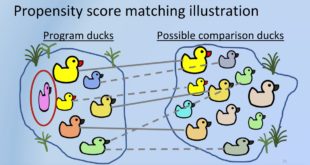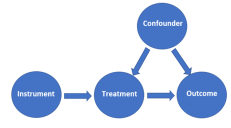Propensity score analysis — some critical remarks Our findings suggest that researchers need comprehensive knowledge of model assumptions and knowledge of plausible causal structure. From prior research, sources of selection bias must be understood. Substantive knowledge of plausible causal structure typically includes the theory of change of an intervention program being evaluated, which determines the covariates that should be used in the model predicting...
Read More »History of econometric causality
History of econometric causality .[embedded content]
Read More »Randomization strategies (student stuff)
Randomization strategies (student stuff) .[embedded content]
Read More »Synthetic control methods (student stuff)
Synthetic control methods (student stuff) .[embedded content]
Read More »Causal inference methods
.[embedded content]
Read More »Econometrics — the danger of calling your pet cat a dog
Econometrics — the danger of calling your pet cat a dog The assumption of additivity and linearity means that the outcome variable is, in reality, linearly related to any predictors … and that if you have several predictors then their combined effect is best described by adding their effects together … This assumption is the most important because if it is not true then even if all other assumptions are met, your model is invalid because you have described...
Read More »Table 2 Fallacy
.[embedded content]
Read More »Ekonometri och kausalitet
I The Book of Why för Judea Pearl fram flera tunga skäl till varför den numera så populära kausala grafteoretiska ansatsen är att föredra framför mer traditionella regressionsbaserade förklaringsmodeller. Ett av skälen är att kausala grafer är icke-parametriska och därför inte behöver anta exempelvis additivitet och/eller frånvaro av interaktionseffekter — pilar och noder ersätter regressionsanalysens nödvändiga specificeringar av funktionella relationer mellan de i...
Read More »Ignorability and other questionable assumptions in causal inference
Ignorability and other questionable assumptions in causal inference Most attempts at causal inference in observational studies are based on assumptions that treatment assignment is ignorable. Such assumptions are usually made casually, largely because they justify the use of available statistical methods and not because they are truly believed. Marshall Joffe et al. An interesting (but from a technical point of view rather demanding) article on a highly...
Read More »Applied econometrics — a messy business
Applied econometrics — a messy business The applied econometrician is like a farmer who notices that the yield is somewhat higher under the trees where birds roost, and he uses this for evidence that bird droppings increase the yield. However, when he presents his findings … another farmer … objects that he used the same data but came up with the conclusion that moderate amounts of shade increase the yields … A bright chap … then observes that these two...
Read More » Heterodox
Heterodox





